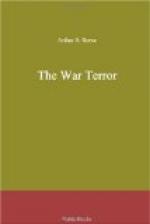I handed the receiver to Craig and picked up the morning paper lying on the table.
“Minturn—dead?” I heard Craig exclaim. “In the paper this morning? I’ll be down to see you directly.”
Kennedy almost tore the paper from me. In the next to the end column where late news usually is dropped was a brief account of the sudden death of Owen Minturn, one of the foremost criminal lawyers of the city, in Josephson’s Baths downtown.
It ended: “It is believed by the coroner that Mr. Minturn was shocked to death and evidence is being sought to show that two hundred and forty volts of electricity had been thrown into the attorney’s body while he was in the electric bath. Joseph Josephson, the proprietor of the bath, who operated the switchboard, is being held, pending the completion of the inquiry.”
As Kennedy hastily ran his eye over the paragraphs, he became more and more excited himself.
“Walter,” he cried, as he finished, “I don’t believe that that was an accident at all.”
“Why?” I asked.
He already had his hat on, and I knew he was going to Josephson’s breakfastless. I followed reluctantly.
“Because,” he answered, as we hustled along in the early morning crowd, “it was only yesterday afternoon that I saw Minturn at his office and he made an appointment with me for this very morning. He was a very secretive man, but he did tell me this much, that he feared his life was in danger and that it was in some way connected with that Pearcy case up in Stratfield, Connecticut, where he has an estate. You have read of the case?”
Indeed I had. It had seemed to me to be a particularly inexplicable affair. Apparently a whole family had been poisoned and a few days before old Mr. Randall Pearcy, a retired manufacturer, had died after a brief but mysterious illness.
Pearcy had been married a year or so ago to Annette Oakleigh, a Broadway comic opera singer, who was his second wife. By his first marriage he had had two children, a son, Warner, and a daughter, Isabel.
Warner Pearcy, I had heard, had blazed a vermilion trail along the Great White Way, but his sister was of the opposite temperament, interested in social work, and had attracted much attention by organizing a settlement in the slums of Stratfield for the uplift of the workers in the Pearcy and other mills.
Broadway, as well as Stratfield, had already woven a fantastic background, for the mystery and hints had been broadly made that Annette Oakleigh had been indiscreetly intimate with a young physician in the town, a Dr. Gunther, a friend, by the way, of Minturn. “There has been no trial yet,” went on Kennedy, “but Minturn seems to have appeared before the coroner’s jury at Stratfield and to have asserted the innocence of Mrs. Pearcy and that of Dr. Gunther so well that, although the jury brought in a verdict of murder by poison by some one unknown, there has been no mention of the name of anyone else. The coroner simply adjourned the inquest so that a more careful analysis might be made of the vital organs. And now comes this second tragedy in New York.”




